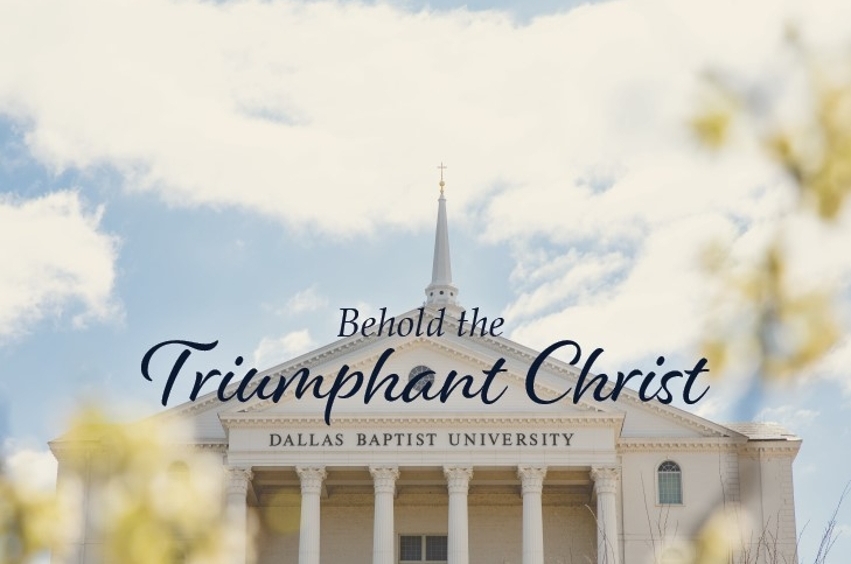The Triumph of Jesus Christ: Easter and the Promise of a New Creation

Jesus entered Jerusalem to waving palm branches and exuberant cries of praise: "Hosanna! Blessed is He who comes in the name of the Lord!"
By Friday evening, He was dead and buried. His disciples had left everything to follow this teacher from Nazareth around the dusty roads of Palestine. For three years, He heralded God's coming Kingdom with divine authority and performed jaw-dropping miracles— He fed the hungry by the thousands and even brought the dead back to life. He was their hope that Israel's long-awaited salvation had arrived!
But this same man in whom they had put their trust, after having been shamefully crucified as a criminal in the most barbaric way the Romans had conceived, now lay buried in a tomb along with their hopes. How could they go on? What would they do now? How could they have been so mistaken about Him? What was God doing in all of this?
Looking back on this side of Easter, we know how the story continued. Although the Scriptures do not unveil the mystery of what transpired between Friday and Sunday, one ancient tradition claims that Jesus descended to where the souls of Old Testament saints lay waiting through the ages for their coming Messiah to usher them triumphantly into heaven.
Where the Gospel accounts pick up the story, however, the stone has been rolled away. The tomb lay empty. Jesus was no longer in there.
Women were the first to witness His resurrected bodily appearance as they came mournfully to perform the traditional burial rituals, and they were the first to pass on the history-making news to the other disciples – though naturally some, like Thomas, refused to believe the word without empirical proof.
Yet we shouldn't hasten to Easter too quickly without contemplating how the disciples felt in the interim: enter empathetically into their confusion, disappointment, doubt, and sorrow.
It was not until later that they understood that God's love and grace had all along been working out their salvation and His glory contrary to human expectations and understanding. Their limited sight was veiled by the tragic murder of someone they dearly loved and in whom they had placed their kingdom hopes - the humblest (and only innocent) servant of God who ever walked the face of the earth.
Jesus' resurrection was the continuation and seal of the victory that was His all throughout His sinless life, fulfilling to perfection every righteous law of God until He willingly drank the last drop of submission in the bitter cup of the cross. The resurrection vindicated that He was, in fact, not the sinful one rejected by God, but the sinless Son beloved, valued, and honored by the Father above all other sons and daughters of Adam – including those who ignored or despised Him.
The hymn of Philippians 2:1-11 tells us that the incarnate humility and righteous obedience of God the Son was rewarded by God the Father to receive the utmost exaltation, honor, and glory from creation. Who else can say they have been resurrected bodily from the grave never to die again? That is a power and authority that is worthy of absolute surrender.
Now Jesus' body lives without corruption forever. He is the hope of all who will belong to Him by faith, that the disgraceful destructiveness of death is not the conclusion of our bodily lives and that our own bodies will be raised to greater glory like His and no longer subject to the mortal passing of time or the pain of disease. What comfort and joy this brings even as we walk through the valley and shadow of death.
Not only this, without Jesus' resurrection, there would have been no ascension. Christ lives right now to intercede to the Father in heaven for us who remain on our pilgrim's sojourn.
In fact, since the fourth century, following the Easter season when Jesus continued to appear to His disciples before His "Great Commission," churches have celebrated as a holy day the Day of Ascension—Jesus' return to the glory of the Father. Through the intercession of Christ, we respectfully, but confidently, enter with Him into the Father's court in the heavenly Holy of Holies with our praises, confessions, thanksgivings, and petitions.
Without Jesus' ascension there would also have been no sending of the Holy Spirit at Pentecost. The Spirit is our comforter, seal, and the deposit of God's dwelling with us until the day that we bask in the inheritance of the full radiance of His glory. To remember the Day of Pentecost, as many of these same churches do, is to remember that Jesus' life, death, and resurrection achieved for us the gift of His empowering and renewing presence until He returns as promised.
Furthermore, Jesus' resurrection is the first fruits of the future harvesting of a resurrected creation: "that the creation itself will be liberated from its bondage to decay and brought into the freedom and glory of the children of God" (Romans 8:19-21). We believe that God can and one day will miraculously transform this fallen world into a glorious eternal home because we believe the testimony of the disciples that Jesus' lifeless body was miraculously raised from death and transformed beyond corruption with immortal glory.
Without the resurrection there simply is no Christianity (1 Corinthians 15:17).
It was not the death of Jesus that brought discouraged Christians out of their homes boldly into the temple courts, the byways of ancient Palestine, and to the nations beyond to turn world history upside down. It was the truth of the resurrection.
As Paul teaches in Romans 6-8, we are to live a new resurrected life now, symbolized by our baptism (Romans 6-8). Also, in Ephesians the apostle says, "And God raised us up with Christ and seated us with Him in the heavenly realms in Christ Jesus" (Ephesians 2:6). The Christian Church throughout the ages stands between the fact of Christ's past resurrection and her hope in the promise of the resurrection to come with such certainty as if the future has already occurred.
This means that although we will continue to experience this world as disfigured and broken, God is at work recreating His image in us (Romans 8:28-30) even as He uses us to be vessels of renewal in the places He has called us to live, play, and work. Now we only get partial glimpses, but they are real and they point toward a glorious future of a new creation where love, beauty, peace, and justice—shalom—will reign uninterrupted in God's presence eternally (Revelation 21:1-4).
All of this and more because of Jesus' triumphant resurrection that we celebrate today.
Dr. Michael Whiting is the Director of Written Content in University Communications at Dallas Baptist University.








